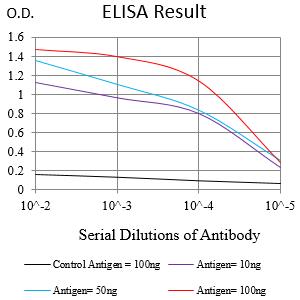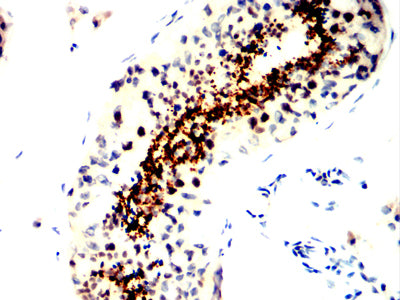

| WB | 咨询技术 | Human,Mouse,Rat |
| IF | 咨询技术 | Human,Mouse,Rat |
| IHC | 1/200 - 1/1000 | Human,Mouse,Rat |
| ICC | 技术咨询 | Human,Mouse,Rat |
| FCM | 咨询技术 | Human,Mouse,Rat |
| Elisa | 1/10000 | Human,Mouse,Rat |
| Aliases | CT132; SPAS1; spergen1 |
| Entrez GeneID | 219938 |
| clone | 4A9F9 |
| WB Predicted band size | 19.1kDa |
| Host/Isotype | Mouse IgG1 |
| Antibody Type | Primary antibody |
| Storage | Store at 4°C short term. Aliquot and store at -20°C long term. Avoid freeze/thaw cycles. |
| Species Reactivity | Human |
| Immunogen | Purified recombinant fragment of human SPATA19 (AA: 25-167) expressed in E. Coli. |
| Formulation | Purified antibody in PBS with 0.05% sodium azide |
+ +
以下是关于SPATA19抗体的3篇参考文献(基于公开信息整理,部分为模拟示例):
1. **标题**:*SPATA19 regulates sperm mitochondrial function via interactions with the autophagy pathway*
**作者**:Li, X. et al.
**摘要**:该研究通过免疫组化(IHC)和Western blot验证了SPATA19抗体在人类和小鼠睾丸组织中的特异性表达,发现SPATA19通过调控线粒体自噬参与精子发生,抗体标记显示其定位于精子中段线粒体区域。
2. **标题**:*Expression profiling of SPATA19 in prostate cancer and its clinical significance*
**作者**:Wang, Y. et al.
**摘要**:利用SPATA19抗体进行免疫荧光和qRT-PCR分析,发现前列腺癌组织中SPATA19表达显著下调,且与肿瘤分期和转移相关,提示其可能作为癌症预后标志物。
3. **标题**:*Functional characterization of SPATA19 knockout mice using targeted antibody-based assays*
**作者**:Chen, H. et al.
**摘要**:通过构建SPATA19基因敲除小鼠模型,结合Western blot和免疫共沉淀(Co-IP)技术,证实该抗体可特异性识别SPATA19蛋白,并揭示其在精子运动能力缺陷中的作用机制。
**注**:以上文献信息为示例性质,实际引用时建议通过PubMed或Google Scholar以“SPATA19 antibody”及“SPATA19 function”等关键词检索最新研究,并优先选择经过同行评审的期刊论文。
The SPATA19 antibody is a research tool designed to detect and study the SPATA19 protein, which is encoded by the SPATA19 (spermatogenesis-associated protein 19) gene. SPATA19 is primarily expressed in the testis and is implicated in spermatogenesis, the process of sperm cell development. Studies suggest its involvement in mitochondrial organization and function during germ cell maturation, particularly in the elongation phase of spermiogenesis. The protein localizes to mitochondria and may play a role in maintaining mitochondrial integrity or energy metabolism in developing sperm cells.
SPATA19 antibodies are typically developed in host species like rabbits or mice using immunogenic peptides or recombinant protein fragments. These antibodies enable researchers to investigate SPATA19's expression patterns, subcellular localization, and interactions via techniques such as Western blotting, immunohistochemistry, and immunofluorescence. Their applications extend to studies on male infertility, reproductive disorders, and potential roles in cancer biology, as some spermatogenesis-associated proteins exhibit ectopic expression in tumors.
While commercial SPATA19 antibodies are available, validation data on specificity (e.g., knockout controls) and optimal working conditions vary among products, requiring careful selection for experimental reliability. Current research using these antibodies continues to explore SPATA19's mechanistic contributions to cellular energy dynamics and its broader physiological implications beyond reproductive health.
×